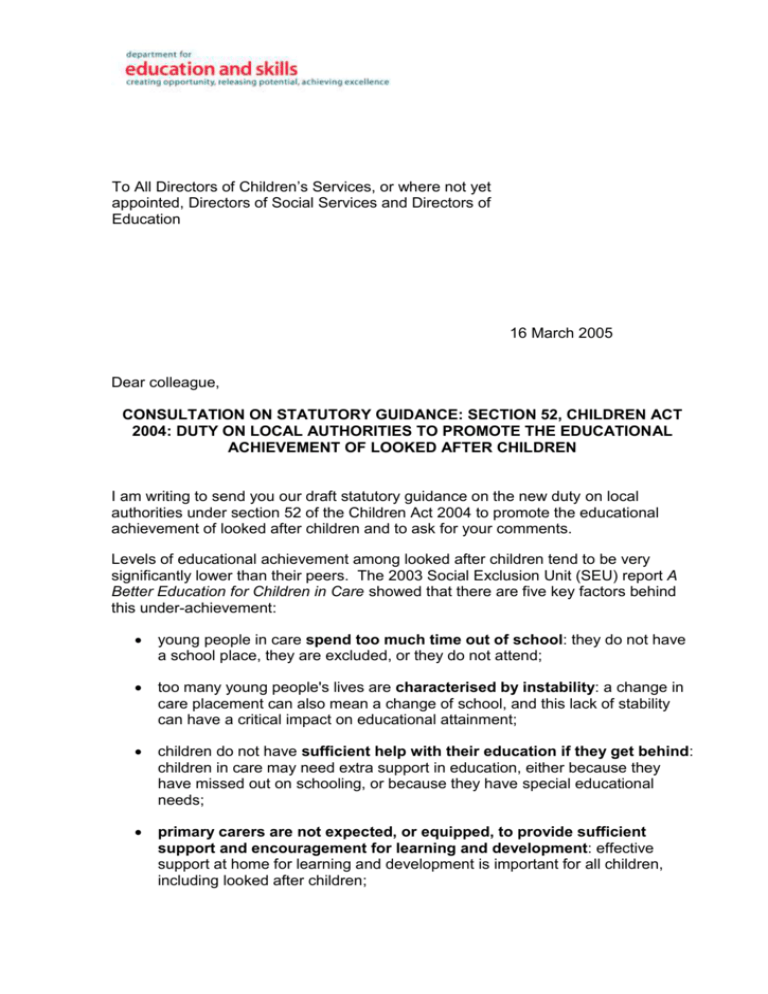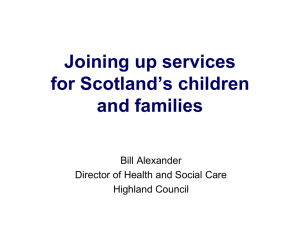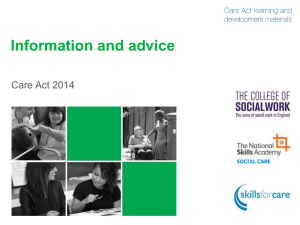New Education Duty - letter from Lord Filkin
advertisement

To All Directors of Children’s Services, or where not yet appointed, Directors of Social Services and Directors of Education 16 March 2005 Dear colleague, CONSULTATION ON STATUTORY GUIDANCE: SECTION 52, CHILDREN ACT 2004: DUTY ON LOCAL AUTHORITIES TO PROMOTE THE EDUCATIONAL ACHIEVEMENT OF LOOKED AFTER CHILDREN I am writing to send you our draft statutory guidance on the new duty on local authorities under section 52 of the Children Act 2004 to promote the educational achievement of looked after children and to ask for your comments. Levels of educational achievement among looked after children tend to be very significantly lower than their peers. The 2003 Social Exclusion Unit (SEU) report A Better Education for Children in Care showed that there are five key factors behind this under-achievement: young people in care spend too much time out of school: they do not have a school place, they are excluded, or they do not attend; too many young people's lives are characterised by instability: a change in care placement can also mean a change of school, and this lack of stability can have a critical impact on educational attainment; children do not have sufficient help with their education if they get behind: children in care may need extra support in education, either because they have missed out on schooling, or because they have special educational needs; primary carers are not expected, or equipped, to provide sufficient support and encouragement for learning and development: effective support at home for learning and development is important for all children, including looked after children; children have unmet emotional, mental and physical health needs that impact on their education: educational outcomes can be strongly influenced by a child's health, and school can boost a child's health through raising selfconfidence and self-esteem, improving participation in sports and providing access to health and sex education. The Government is determined to work with local authorities and other partners to help remove these barriers. Looked after children are entitled to expect to enjoy the same outcomes as other children, including in education. Making a real difference to the life chances of this particularly vulnerable group of children and young people will be a key test of the impact of the Every Child Matters: Change for Children programme. That is why last year the Government published a new PSA target to narrow the gap in educational achievement between looked after children and their peers, and improve their educational support and the stability of their lives. The Government has also committed itself to ensuring that the central actions set out in the SEU report are effectively implemented. The duty on local authorities to promote the educational achievement of looked after children, introduced by section 52 of the Children Act 2004, is a key vehicle for delivering the radical change we want to see. The duty is designed to ensure that local authorities take particular account of the educational implications of every decision they take about the welfare of every child they are responsible for looking after. The statutory guidance under-pinning the duty, on which we are now consulting, is designed to set out the core actions which local authorities should undertake to ensure they effectively promote the educational achievement of looked after children. This guidance therefore replaces the statutory guidance contained in the Department of Health’s Local Authority Circular 2000(13), which was published in May 2000, but is not designed to update the non-statutory guidance published in the accompanying Guidance on the Education of Children and Young People in Public Care. That guidance stands but will be updated during the course of this year. I hope that all local authorities in taking the lead on the development of children’s trusts with other agencies are now actively planning how to improve the educational outcomes of looked after children. Reading and commenting on the draft guidance may contribute to this process. The duty to promote the educational achievement of looked after children has been widely welcomed. This guidance builds on the existing responsibilities of local authorities to safeguard and promote the welfare of looked after children. We expect its impact to be cost neutral. We do not expect authorities to spend more in order to achieve a better outcome. We believe that improvements in the educational achievement for looked after children can be achieved through better use of existing resources and by developing more effective ways of working as part of local Change for Children programmes. 2 The duty to promote the educational achievement of looked after children is part of our overarching strategy to achieve better outcomes for this vulnerable group. I shall be writing separately about this overall strategy and have also written, more specifically, on the work we are taking forward to reduce the number of unnecessary out-of-authority placements. In the meantime, I look forward to receiving your views on the draft guidance which is available on the DfES Consultations website at: http://www.dfes.gov.uk/consultations/. I am copying this letter to Local Authority Chief Executives, Alison King at the Local Government Association, John Coughlan and Andrew Christie at the Association of Directors of Social Services, Sarah Caton at the Confederation of Education and Children’s Services Managers, David Hawker at the Association of Directors of Education and Children’s Services, David Behan at the Commission for Social Care Inspection and to David Bell at the Office for Standards in Education. GEOFFREY FILKIN cc. Chief Executives Lead members LGA ADSS ConfEd ADECS CSCI OfSTED 3









